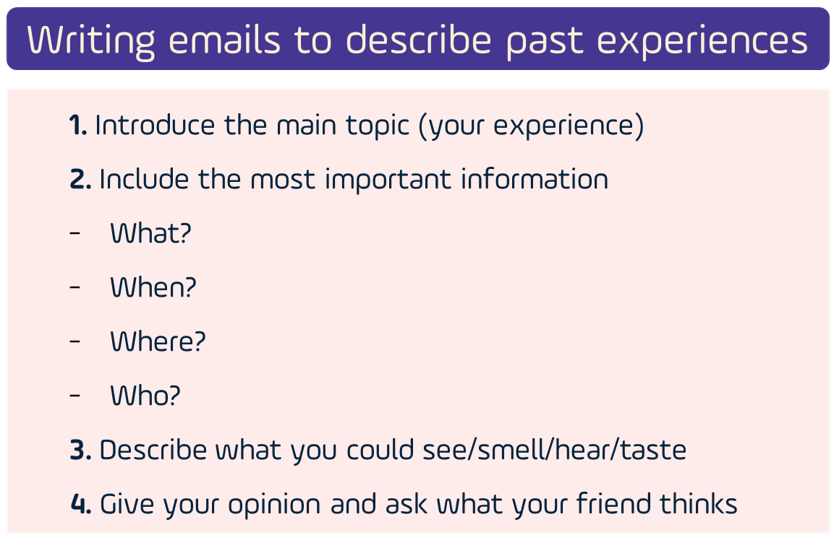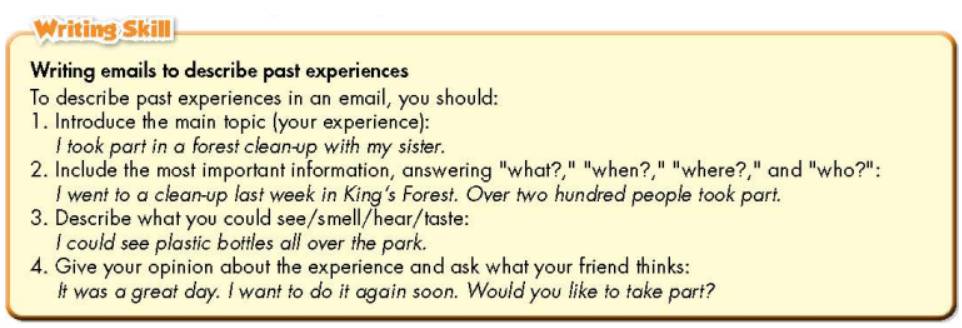Writing emails to describe the past experiences.

a. Read about writing emails to describe past experiences. Then, read Jane's email again and circle the information, answering "what?", "when?", "where?" and "who?"
(Đọc về việc viết email để mô tả những trải nghiệm trong quá khứ. Sau đó, đọc lại email của Jane và khoanh tròn thông tin, trả lời “Làm gì?, Khi nào?, Ở đâu? và “Ai?”)

What? - Cleaned up the beach.
When? - On Tuesday morning.
Where? - At Pebble beach in Somerton.
Who? - Jane.
Tạm dịch:
Kỹ năng viết
Viết email để mô tả kinh nghiệm trong quá khứ
Để mô tả kinh nghiệm trong quá khứ trong email, bạn nên:
1. Giới thiệu chủ đề chính (kinh nghiệm của bạn):
Tôi đã tham gia vào một cuộc dọn dẹp rừng với em gái của tôi.
2. Bao gồm thông tin quan trọng nhất, trả lời "cái gì?" "khi nào ?," "ở đâu ?," và "ai?":
Tôi đã đến dọn dẹp vào tuần trước ở King's Forest. Hơn hai trăm người đã tham gia.
3. Mô tả những gì bạn có thể thấy / ngửi / nghe / nếm:
Tôi có thể nhìn thấy những chai nhựa ở khắp nơi trong công viên.
4. Đưa ra ý kiến của bạn về trải nghiệm và hỏi bạn bè của bạn nghĩ gì:
Thật là một ngày tuyệt vời. Tôi muốn làm lại sớm. Bạn có muốn tham gia không?
Make questions for the following answers
By writing emails to her friends.
to her friends /leans to write /lan /by writing emails
Study the rule and choose the correct options.
RULES We use if + present / past simple to describe a(n) likely / unlikely situation, then would with a verb without to to describe the result / location. |
Remember! If I became a volunteer, would I have to work in the evening? Would I have to work in the evening if I became a volunteer? |
Choose the correct options to complete the rules.
RULES 1. We use the first conditional to talk about a possible event and its result in the future / past. 2. We introduce the situation with if or unless + present / past simple. 3. We describe the result with will and won’t / do and doesn’t + infinitive without to. 4. We use unless to say if... not / if ... when. 5. When the if clause is first / second, we use a comma. When the if clause comes first / second, we don't need a comma. If the Earth gets too crowded, we'll move to other planets. We'll move to other planets if the Earth gets too crowded. |
1. future
2. present
3. will and won't
4. if...not
5. first/ Second
III.Complete the text with the past simple, presentcontinuous or future continuous.
1. It (be) expensive to make a phone call in a long distance 10 year ago.
2.Nowadays, emails and video chat (help) people to contact to each other easily and inexpensively.
3.By this time tomorrow, I (learn) Japanese at Language Center.
4.When I (be) young, I and my friend (write) letters to each other so that we could keep in touch.
5.In 20 years I think I (talk) to my children by telegraph and holograph when they live far away from home.
6. Last night I (make) several phone calls to her, but she (not answer) .Now I (be) worried about her.
7. In the year 2020, they (invent) some devices to help people who cannot hear or speak to communicate through their mind.
8.She (plan) to have an outing with her family this Sunday.
Giúp mk vs ạ ,mk đg cần gấp TT !
1. It (be) was expensive to make a phone call in a long distance 10 year ago.
2.Nowadays, emails and video chat (help) are helping people to contact to each other easily and inexpensively.
3.By this time tomorrow, I (learn) will be learning Japanese at Language Center.
4.When I (be) was young, I and my friend (write) wrote letters to each other so that we could keep in touch.
1. It (be) was expensive to make a phone call in a long distance 10 year ago.
2. Nowadays, emails and video chat are helping (help) people to contact to each other easily and inexpensively.
3.By this time tomorrow, I (learn) will learning Japanese at Language Center.
4.When I (be) was young, I and my friend (write) wrote letters to each other so that we could keep in touch.
5.In 20 years I think I (talk) will be talked to my children by telegraph and holograph when they live far away from home.
6. Last night I (make) made several phone calls to her, but she (not answer) didn't answered .Now I (be) am worried about her.
7. In the year 2020, they (invent) will invent some devices to help people who cannot hear or speak to communicate through their mind.
8.She (plan) is planning to have an outing with her family this Sunday.
1. was
2. help
3. am learning
4. was/wrote
5. have been talking
6. made/didn't answer/am
7. invented
8. plans
you are writing an article about a scary you are writing an article about a scary experience for an international school magazine, think about a scary experience that you had in the past . Draw a picture of it in the bow below . THen write about your experience . Describe what happend , how your felt , what you did , etc . Your scary experience can be any thing from spending a night in a haunted house , to seeing something that you afraid of . Include a title . Be creative and have fun
you are writing an arle about a scary you are writing an arle about a scary experience for an international school magazine, think about a scary experience that you had in the past . Draw a picture of it in the bow below . THen write about your experience . Describe what happend , how your felt , what you did , etc . Your scary experience can be any thing from spending a night in a haunted house , to seeing something that you afraid of . Include a title . Be creative and have fun
bản dịch:
Bạn đang viết một bài báo về một điều đáng sợ, bạn đang viết một bài báo về một kinh nghiệm đáng sợ cho một tạp chí trường quốc tế, suy nghĩ về một kinh nghiệm đáng sợ mà bạn đã có trong quá khứ. Vẽ một hình ảnh của nó trong vòng cung bên dưới. Sau đó viết về trải nghiệm của bạn. Mô tả những điều thú vị, cảm xúc của bạn, những gì bạn đã làm, v.v. Kinh nghiệm đáng sợ của bạn có thể là bất cứ điều gì từ chi tiêu một đêm trong một ngôi nhà ma ám, để nhìn thấy một cái gì đó mà bạn sợ. Bao gồm một tiêu đề. Hãy sáng tạo và vui chơi
~ bài này cũng hay đó ~
Cách sử dụng của thì quá khứ tiếp diễn, mọi người dịch cho mình nhé vì 2 cái này có nghĩa gan giống nhau mình ko phân biệt đc ạ
1. To describe an action that was interrupted by another action in the past. The action with the longest duration is in the past continuous
2. To describe an action that was already taking place when another action happened in the past
Topic:
1. Talk about the ways to protect the environment. 2. Describe the life in the city you know. 3. Talk about the stress resources and the ways to over come. 4. Describe the life in the past. 5. Wonders of Viet Nam. 6. Talk about the changes in Viet Nam recently.